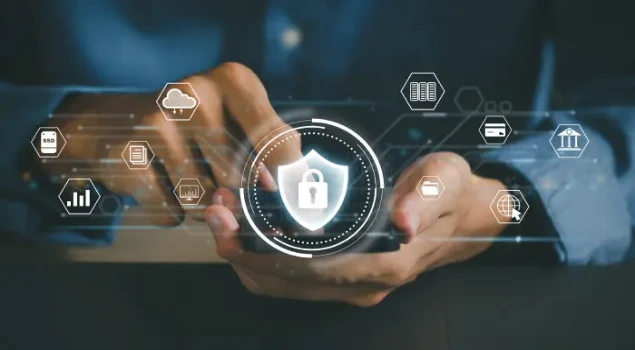15
+
YEARS OF
EXPERIENCE
1000
+
SUCCESSFUL
Projects
80
+
Satisfied
Clients

As organizations adopt digital tools, cloud services, and remote work solutions, ensuring the safety of workplace technology has never been more critical. Modern Workplace Security encompasses the strategies, policies, and technologies that protect employees, devices, networks, and data in today’s highly connected and dynamic work environments. By implementing a robust security framework, businesses can safeguard sensitive information, maintain compliance, and enable employees to work efficiently without compromising safety.
Understanding Modern Workplace Security
Modern Workplace Security refers to the comprehensive approach used to protect the digital tools and environments that employees rely on daily. This includes securing desktops, laptops, mobile devices, cloud services, collaboration platforms, and enterprise applications. It also involves managing user access, monitoring network activity, and enforcing policies that prevent unauthorized access and cyber threats.
The strategy integrates multiple layers of defense, combining technological solutions such as endpoint protection, data encryption, multi-factor authentication, and threat detection with organizational practices, including security awareness training and policy enforcement.
The goal of modern workplace security is to create a secure environment that supports productivity and collaboration while minimizing the risk of cyber incidents.





The Importance of Modern Workplace Security
The modern workplace is increasingly mobile, distributed, and cloud-driven. Employees access sensitive data from multiple devices, locations, and platforms, creating new vulnerabilities. Without a comprehensive security approach, organizations risk data breaches, financial losses, regulatory non-compliance, and reputational damage. Modern Workplace Security addresses these risks by implementing protective measures across all digital touchpoints.
Modern workplace security also ensures regulatory compliance. Many industries require strict adherence to standards such as GDPR, HIPAA, and ISO 27001. By enforcing security controls and monitoring compliance, organizations protect sensitive information and demonstrate accountability to clients, partners, and regulators.
Additionally, security in the modern workplace fosters employee confidence and efficiency. When employees know that systems are secure and reliable, they can focus on their work rather than worrying about potential threats or system downtime.
How Modern Workplace Security Works
Implementing Modern Workplace Security begins with an assessment of the organization’s digital environment. Security teams evaluate devices, applications, cloud services, and network configurations to identify vulnerabilities, misconfigurations, and potential threat vectors.
Once gaps are identified, security policies and technologies are deployed to protect endpoints, cloud services, and networks. Measures may include multi-factor authentication, identity and access management, endpoint detection and response (EDR), encryption, network segmentation, and monitoring solutions.
Continuous monitoring and threat detection are essential components of modern workplace security. IT teams track user behavior, application activity, and network traffic to identify anomalies and potential threats. Automated alerts and response protocols help contain incidents before they escalate, maintaining operational continuity.
Employee training and awareness programs are also integral. Educating staff on secure practices, phishing awareness, password management, and safe cloud usage reduces the likelihood of human error, which remains one of the leading causes of cybersecurity breaches.
Security Services
Comprehensive security services designed to protect your business from cyber threats, data breaches, and evolving digital risks.Hybrid Security
Hybrid security solutions integrating on-premises and cloud protection for consistent, scalable, and unified threat defense.Security Audit
Thorough security audits to identify vulnerabilities, ensure compliance, and strengthen your organization’s overall cybersecurity posture.
The Role of Modern Workplace Security in Business Continuity
Modern workplace security is critical for maintaining business continuity. Digital tools and platforms are central to day-to-day operations, and any disruption can significantly impact productivity and revenue. By implementing robust security measures, organizations can prevent unauthorized access, data loss, and operational interruptions, ensuring employees can work safely and efficiently.
Security teams also develop incident response plans, including disaster recovery protocols and backup strategies. This ensures that in the event of a cyberattack, hardware failure, or system outage, business operations can continue with minimal disruption, protecting both productivity and organizational reputation.
Business Benefits of Modern Workplace Security
Modern Workplace Security offers multiple advantages for businesses. It reduces the risk of cyberattacks, data breaches, and operational downtime, allowing employees to focus on their work without interruptions. Organizations gain greater visibility into their IT environment, enabling proactive risk management and informed decision-making.
Compliance and accountability are strengthened, ensuring adherence to industry standards and regulatory frameworks. Operational efficiency is enhanced through standardized security processes, automation, and continuous monitoring.
Modern workplace security also supports innovation and digital transformation. By securing cloud platforms, collaboration tools, and endpoints, organizations can confidently adopt new technologies, enhance remote work capabilities, and scale operations without compromising safety.
Conclusion: Building a Secure Digital Workplace
Modern Workplace Security is essential for protecting today’s connected and mobile workforce. By combining technology, policies, and employee awareness, it ensures that devices, applications, networks, and data are safeguarded from cyber threats.
Within the broader framework of security services, modern workplace security strengthens operational resilience, enables regulatory compliance, and empowers employees to work confidently. Investing in modern workplace security ensures that organizations can protect critical assets, maintain productivity, and thrive in a dynamic digital-first business environment.

answer time
satisfaction
score
on initial call
same business
day









